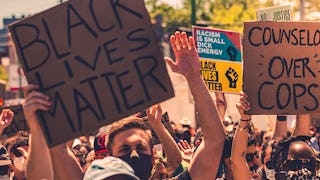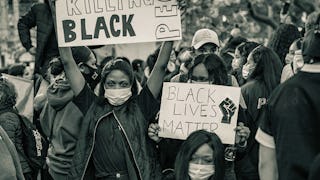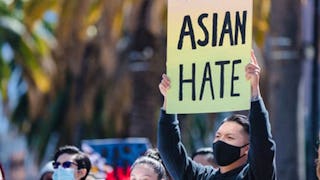Anti-Racism I is an introduction to the topic of race and racism in the United States. The primary audience for this course is anyone who is interested in learning about race/racism in the US who has never taken a course in critical race or ethnic studies or affiliated fields (indeed, who may not know what the fields of critical race studies or ethnic studies are), who has never read a book about race/racism, or attended any race equity or diversity trainings on the topic of race/racism.



Anti-Racism I
This course is part of Anti-Racism Specialization


Instructors: Shawn
28,015 already enrolled
Included with 
(278 reviews)
Recommended experience
What you'll learn
how to talk about race and racism
how to distinguish the difference between talking about race/racism and participating in racist acts
how to use contemporary intersectional terminology through a provided glossary
how to define systemic and institutional racism
Skills you'll gain
Details to know

Add to your LinkedIn profile
1 assignment
See how employees at top companies are mastering in-demand skills

Build your subject-matter expertise
- Learn new concepts from industry experts
- Gain a foundational understanding of a subject or tool
- Develop job-relevant skills with hands-on projects
- Earn a shareable career certificate

There are 3 modules in this course
This week you will learn various ways of defining race through definitions of whiteness. While race and racism have, in popular discourse, been understood to refer to non-white people, we start with whiteness since whiteness has been the primary ideology that dominated the formation of the United States, its laws, power structure, society, and culture. The anti-racism glossary also provides a variety of definitions related to race, racism, and anti-racism.
What's included
3 videos7 readings1 assignment1 discussion prompt
Now that you've learned to define whiteness and other terms related to race, racism, and anti-racism, this week focuses on identifying the impact of race, racism, and anti-racism. The first article contextualizes our current moment of racial crisis, along with identifying differences between being not-racist and anti-racist. The remaining readings and viewings provide historical context for systemic racism, especially anti-Black racism in the US.
What's included
1 video8 readings1 discussion prompt
For this final week of the anti-racism course you will see how the application of these terms and concepts are tied to other overlapping oppressions and how they can be used for specific anti-racism work, such as defunding the police (and why this is not as radical as people may think it is, though in many ways to imagine an anti-racist world is a radical act) and specific actions that each of us can do to be anti-racism allies and educators.
What's included
3 videos11 readings1 peer review1 discussion prompt1 plugin
Earn a career certificate
Add this credential to your LinkedIn profile, resume, or CV. Share it on social media and in your performance review.
Instructors

Offered by
Explore more from Governance and Society
 Status: Free Trial
Status: Free Trial
University of Colorado Boulder
 Status: Free Trial
Status: Free Trial
University of Colorado Boulder
 Status: Free Trial
Status: Free Trial
University of Colorado Boulder


University of Colorado Boulder
Why people choose Coursera for their career




Learner reviews
278 reviews
- 5 stars
81.29%
- 4 stars
11.51%
- 3 stars
1.79%
- 2 stars
1.07%
- 1 star
4.31%
Showing 3 of 278
Reviewed on Dec 4, 2022
I found the material in this course to be well curated, engaging, highly influential, and pertinent in informing the future of my work and personal life.
Reviewed on Oct 17, 2021
Absolutely essential course to help understand how North America colonialism has been founded on racism and how to start dismantling it.
Reviewed on Feb 8, 2022
Great Course, but its showing taht I havent completed it. When I have.

Open new doors with Coursera Plus
Unlimited access to 10,000+ world-class courses, hands-on projects, and job-ready certificate programs - all included in your subscription
Advance your career with an online degree
Earn a degree from world-class universities - 100% online
Join over 3,400 global companies that choose Coursera for Business
Upskill your employees to excel in the digital economy
Frequently asked questions
Access to lectures and assignments depends on your type of enrollment. If you take a course in audit mode, you will be able to see most course materials for free. To access graded assignments and to earn a Certificate, you will need to purchase the Certificate experience, during or after your audit. If you don't see the audit option:
The course may not offer an audit option. You can try a Free Trial instead, or apply for Financial Aid.
The course may offer 'Full Course, No Certificate' instead. This option lets you see all course materials, submit required assessments, and get a final grade. This also means that you will not be able to purchase a Certificate experience.
When you enroll in the course, you get access to all of the courses in the Specialization, and you earn a certificate when you complete the work. Your electronic Certificate will be added to your Accomplishments page - from there, you can print your Certificate or add it to your LinkedIn profile. If you only want to read and view the course content, you can audit the course for free.
If you subscribed, you get a 7-day free trial during which you can cancel at no penalty. After that, we don’t give refunds, but you can cancel your subscription at any time. See our full refund policy.
More questions
Financial aid available,

